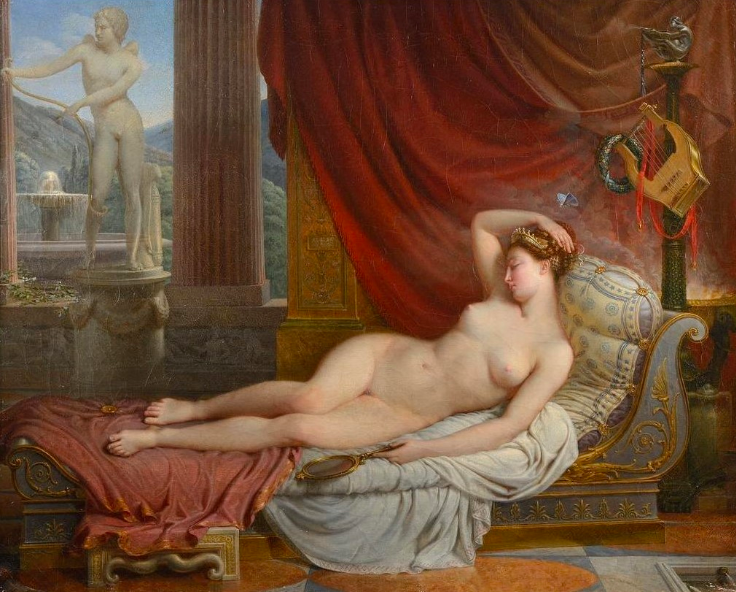
Psyche: Heartbroken to Healing
It is my experience that people only enter therapy when they’re in pain. Rock bottom is a great time to start helping oneself.
Heartbreak is an incredible motivator to explore your own consciousness, analyze behavioral patterns, and break negative cycles.
In the myth, Psyche is motivated by her extreme pain at the loss of Eros – love itself. She’s extremely determined to have love in her life, and launches into an incredible journey of self-growth that is a template for all Aphrodisian Women to find independence, peace, and joy in their lives – with or without a partner.
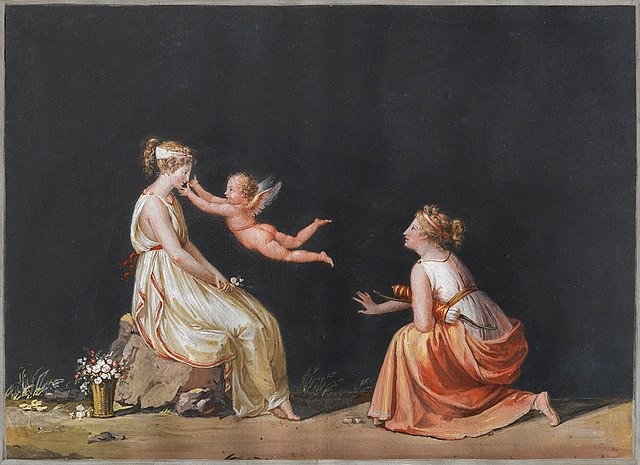
Like many men who portray themselves as masculine and powerful, Eros is a man-child. Maybe that is why we often see him depicted as a baby with wings, diapers, and all!
Distraught from being abandoned by her husband, Psyche sets out to find Eros. Where did he fly to? His mommy, Aphrodite, of course.
Many women find themselves dating a man-child. Is there a version of Eros in your life?
There are “book dumb” ones who get women to do all the work for them. Then there are “daydreamers" who present themselves as the tortured artist to avoid having to do adult tasks. You might fall for “the hot fool” who depends on women to take care of their every need and have no respect for them at all. We all know the “useless genius” who can do advanced physics but never washes a dish.
Others pretend to be the “tortured man” who seduces women by playing a beautiful and sensitive tortured soul. Still, they do not want to heal. They enjoy their “suffering” and believe pain makes them profound.
Most of these man-children are mama’s boys, and Eros is no exception.
When Eros leaves Psyche, he runs home to the palace of his mom to recover from his wife’s “betrayal.” Depressed, he blames everything on Psyche. He refuses, even, to do his work as the god of Love, sending arrows of love among mortals. There are no weddings, even friendships, and parents feel no bond with their newborn children. But finally, having lived in his own fury long enough, he begins to miss Psyche and believes he may need to make some changes. Although change is a catalyst for growth, it is confusing, challenging, and painful even for Eros.
Aphrodite finally realizes that Eros is head over heels for her nemesis, Psyche. She is furious, feeling her son made her a laughingstock by marrying a mere mortal. She rallies her friends—other powerful goddesses—demanding they find ways to find and torture her.
Meanwhile, to win back Eros, Psyche visits the temples of other goddesses, trying on the masks of their various archetypes while avoiding her own archetype, the goddess of sex. She first visits Demeter, the goddess of agriculture and growth. Demeter warns Psyche that Aphrodite has marked her for destruction and tells Psyche to grow, old habits endanger the life that that of unborn child. (Did we mention Psyche’s pregnant?)
Psyche, distraught, doesn’t take Demeter’s advice. Instead, she trudges to the temple of Hera, queen of the gods and goddess of motherhood and family, hoping for answers. Surely Hera will know how to win Eros back!
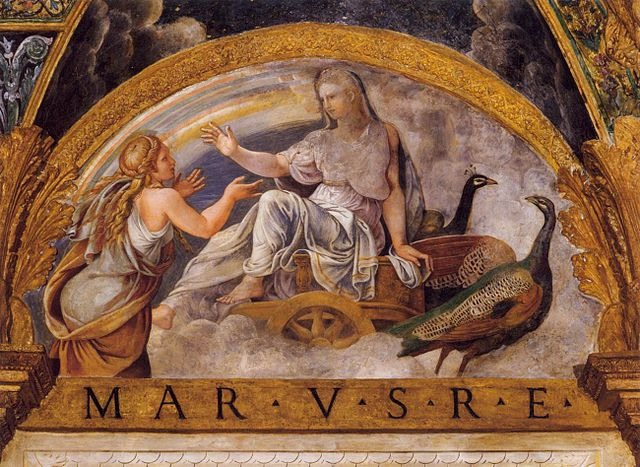
Psyche turning to Hera is symbolic of a goddess of sex trying to wear the mask of a submissive wife. But Hera denies Psyche refuge, symbolic of how all women must embrace their own archetypes.
In the meantime, Aphrodite turns to Mount Olympus, the heavenly home of the gods. She calls on them all to target Psyche. Aphrodite represents our ego, the self-focused aspect of our Self. It can take the form of the dark, selfish side of our ego, supreme narcissism. Aphrodite is self-obsessed, but her jealousy takes the form of abusing Psyche.
She mandates the other gods and goddesses to harm the mortal, symbolic of the superego–the collective ideals of the society atop Olympus to take part in destroying Psyche.
The tyrannical, power-based nature of Aphrodite's ego, together with the superego, conspires against Psyche. If Psyche, a mere mortal, is allowed to co-exist as an equal and continue to be worshipped on a pedestal like a goddess, all gods and goddesses' power will be usurped.
Hermes, the messenger god, publicly proclaims that Psyche must be turned over to Aphrodite. All of Olympus conspires against her.
For modern goddesses of sex, Hermes represents the media that blackballs and obsesses over her.
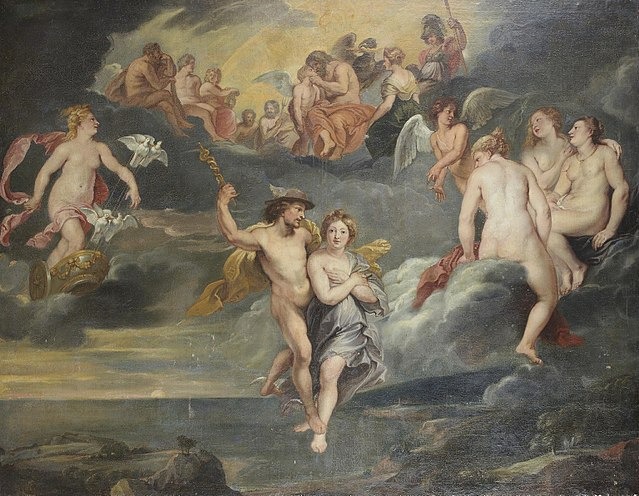
The superego could take the form of newspapers, magazines, tabloids, and everyday social media. The arts can embody this harassment; for example, media depictions in movies and late-night comedians who publicly mock her as a “dumb slut,” or in other humiliating caricatures.
Today, for women who are victims of crimes or go through public break-ups or scandals, the press often expresses sympathy for the male perpetrators. Innocence and guilt in these circumstances are only a matter of perspective. They portray the women as scheming “social climbers” who trapped that man or baited him into loving and hurting them.
The strength of those unwritten rules within society broadly–and the superego in our lives– is used to ostracize and isolate women for their sexuality, set them apart so they can easily be hunted and captured, all in the hopes of reintegrating them into the social order, be it by submission or destruction.
Aphrodite offers a reward for Psyche: seven of her sweet kisses. Thrilled by this reward, even mortal men began their search for Psyche. In our society, a bounty is offered to target those who embody the Aphrodite archetype, such as Psyche.
Ultimately, Psyche has no choice but to meet Aphrodite face to face. This is facing her archetype – at its most dangerous.
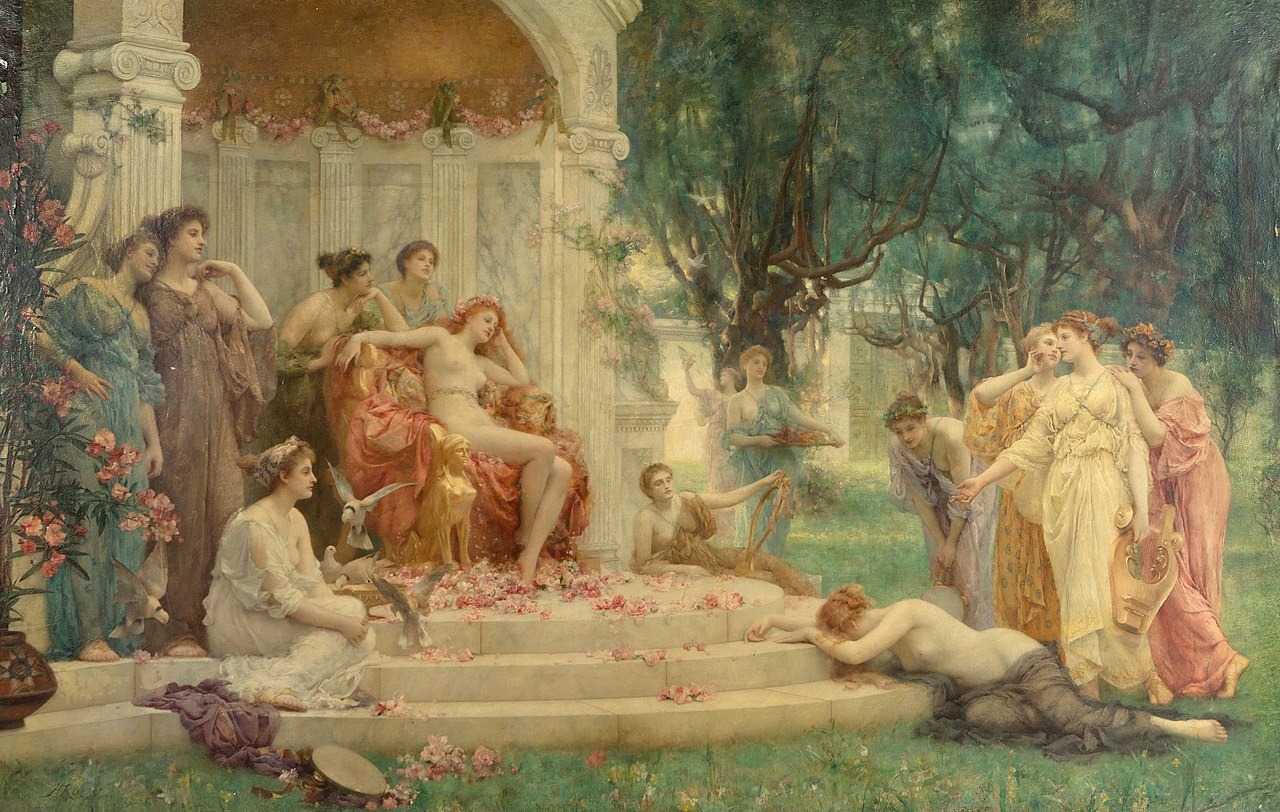
Psyche means the center of thought, feeling, and motivation. It translates from Greek directly to “the soul.” So Psyche represents the soul of a seductress, in most fundamental terms.
Thus, Soul begins the hard road back to face Ego, perhaps even her demise. But Ego and Soul intertwine. Aphrodite could have murdered the young woman in cold blood. However, she chose to torture her instead. The ego and soul need each other; they are actually one Self. If Aphrodite murders Psyche, she is killing herself.
The story of Psyche is not over. She is about to embark on her healing journey, which we will explore in the next post.
Unfortunately, many contemporary goddesses of sex never embark on such a transformation. What makes Psyche different?
People often stop their therapy and self-work when they are out of debilitating pain. They have done triage, but not fully healed.
Psyche goes through the whole journey to the underworld and back. Most people don’t want to do this work. Why would they? It hurts, it's challenging, and it seems like it's never going to end. But fortunately, the benefits far outweigh the costs. You gain control of your life despite what happens in the outside world. You acquire the tools to survive and thrive.
Psyche was terrified that if she shined the light, she would lose everything she had become accustomed to. Although he was no monster physically, even the god of Love had a dark side. So, waking in shock, Eros was exposed and vulnerable. Instead of regrouping and starting to share his true Self with his wife, he immediately abandons the relationship.
Like Psyche, you often lose others in the process of finding yourself. But, if they return, it will be a brand new relationship with new possibilities.
When Psyche saw Eros for the first time, she was floored that her husband was the god of Love. But Eros interpreted her adoration as many overwhelming expectations. Eros did not want to become self-responsible. Although Psyche's intentions were loving, Eros did not want to be seen by her.
Psyche was on her own, and pregnant.
We're going to go with Psyche on her healing journey and explore how it is the perfect template for all women with her archetype.
Post a comment